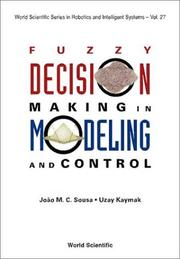| Listing 1 - 3 of 3 |
Sort by
|
Book
ISBN: 1281929840 9786611929848 9812777911 9789812777911 Year: 2002 Publisher: River Edge, N.J. : World Scientific,
Abstract | Keywords | Export | Availability | Bookmark
 Loading...
Loading...Choose an application
- Reference Manager
- EndNote
- RefWorks (Direct export to RefWorks)
Decision making and control are two fields with distinct methods for solving problems, and yet they are closely related. This book bridges the gap between decision making and control in the field of fuzzy decisions and fuzzy control, and discusses various ways in which fuzzy decision making methods can be applied to systems modeling and control.Fuzzy decision making is a powerful paradigm for dealing with human expert knowledge when one is designing fuzzy model-based controllers. The combination of fuzzy decision making and fuzzy control in this book can lead to novel control schemes that impr
Control theory. --- Decision making. --- Fuzzy decision making. --- Decision making --- Fuzzy mathematics --- Deciding --- Decision (Psychology) --- Decision analysis --- Decision processes --- Making decisions --- Management --- Management decisions --- Choice (Psychology) --- Problem solving --- Dynamics --- Machine theory

ISBN: 9810248776 Year: 2002 Publisher: River Edge, N.J. : World Scientific,
Abstract | Keywords | Export | Availability | Bookmark
 Loading...
Loading...Choose an application
- Reference Manager
- EndNote
- RefWorks (Direct export to RefWorks)
Digital
ISBN: 9783642302787 Year: 2013 Publisher: Berlin, Heidelberg Springer
Abstract | Keywords | Export | Availability | Bookmark
 Loading...
Loading...Choose an application
- Reference Manager
- EndNote
- RefWorks (Direct export to RefWorks)
Soft computing, as an engineering science, and statistics, as a classical branch of mathematics, emphasize different aspects of data analysis. Soft computing focuses on obtaining working solutions quickly, accepting approximations and unconventional approaches. Its strength lies in its flexibility to create models that suit the needs arising in applications. In addition, it emphasizes the need for intuitive and interpretable models, which are tolerant to imprecision and uncertainty. Statistics is more rigorous and focuses on establishing objective conclusions based on experimental data by analyzing the possible situations and their (relative) likelihood. It emphasizes the need for mathematical methods and tools to assess solutions and guarantee performance. Combining the two fields enhances the robustness and generalizability of data analysis methods, while preserving the flexibility to solve real-world problems efficiently and intuitively.
Operational research. Game theory --- Applied physical engineering --- Computer science --- Information systems --- Artificial intelligence. Robotics. Simulation. Graphics --- neuronale netwerken --- fuzzy logic --- cybernetica --- stochastische analyse --- vormgeving --- computers --- mineralen (chemie) --- simulaties --- mijnbouw --- database management --- informatietechnologie --- gegevensanalyse --- KI (kunstmatige intelligentie) --- ingenieurswetenschappen --- computerkunde --- data acquisition
| Listing 1 - 3 of 3 |
Sort by
|

 Search
Search Feedback
Feedback About UniCat
About UniCat  Help
Help News
News